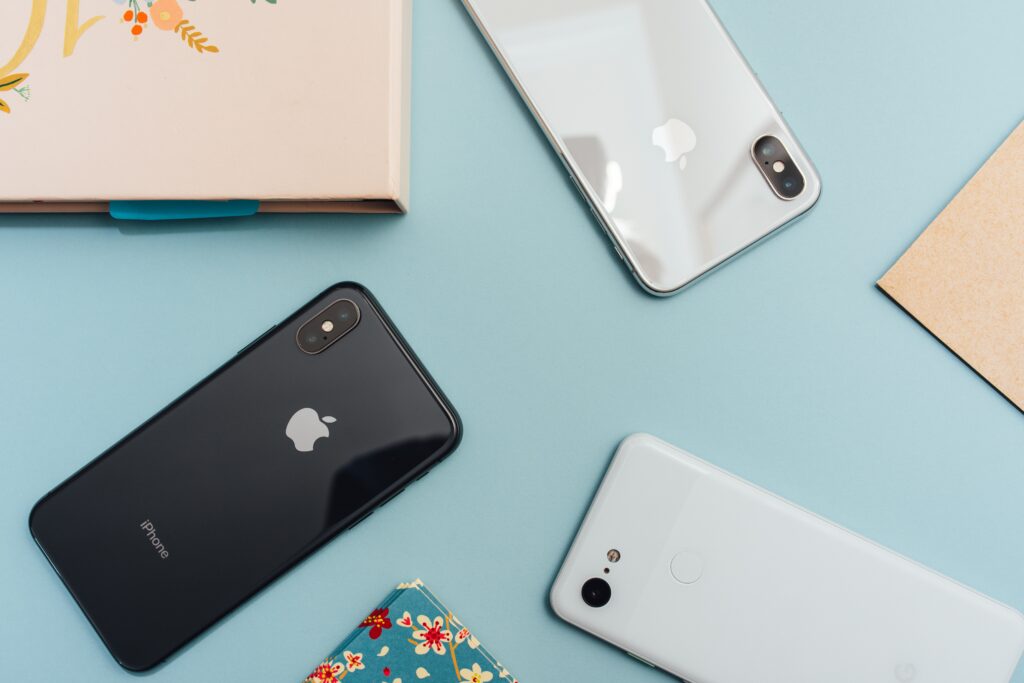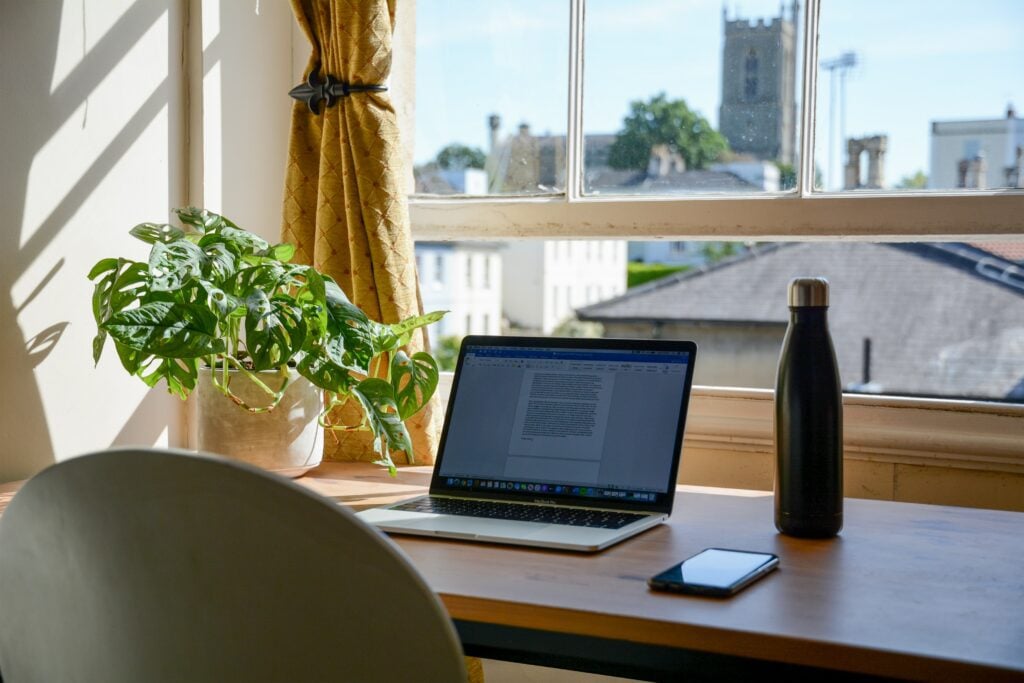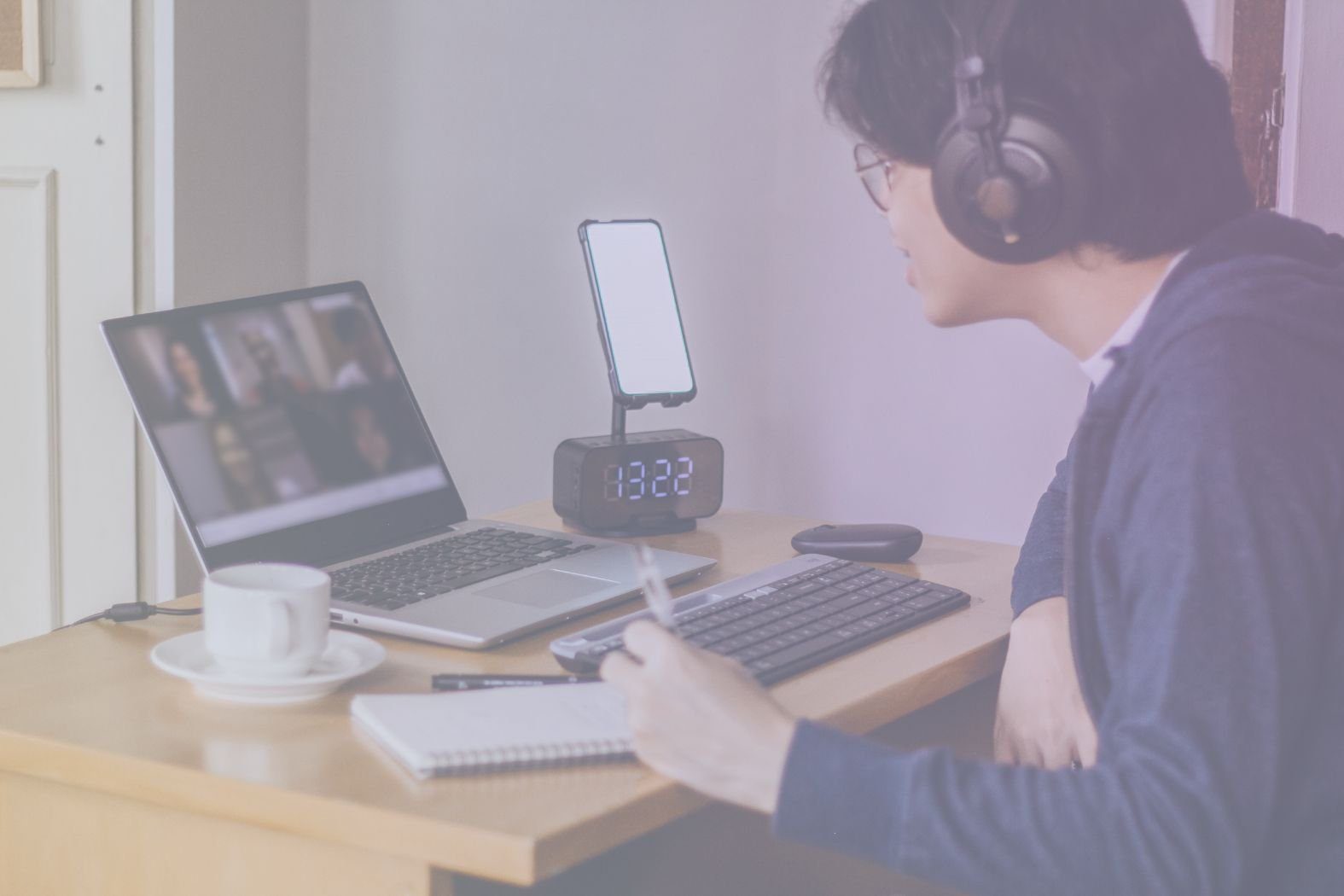If you want to blur your Zoom background in 2026, you’ve come to the right place. Methods might change over the years, but the mess doesn’t!
Has your kid taken a crayon to the wall, channeling their inner Picasso? Is your bookshelf overflowing with files and folders that should have been sorted five years ago? Are the stacks of cereal bowls and coffee cups on your desk beginning to resemble the Leaning Tower of Pisa? We all experience mess from time to time, and when we do, we don’t need the silent judgment of our colleagues to make matters worse.
If you are willing to work remotely, you should know that it has its perks and peeves and one of the biggest peeves can be the insistence we keep our video on. Well, if you’re being asked to show your lovely face but your backdrop looks like a jumble sale, then the blur camera filter is your best friend. To keep things professional, and prevent your personal mess from distracting colleagues in an otherwise corporate meeting, the classic blurred background is a lifesaver!
We’ll explain in a few simple steps how to get that forgiving blur background on Zoom, whether you’re using the Zoom app on mobile (iOS and Android) or PC (Windows, Linux, and macOS).

How to Blur Your Background in Zoom (2026)
Blurring your zoom background doesn’t require any magic powers. All you need to do is edit your camera settings. Where you’ll find those settings varies a little depending on whether you’re accessing Zoom from mobile or PC, app or web client. No matter what device or OS you’re on, the first step is to enable the Zoom background feature.
Enable Zoom Background Blur Feature
First thing’s first: before tinkering around in the Zoom app to blur your zoom background, you’ll need to go to your Zoom web client and head over to the settings. What you will see will be slightly different depending on what kind of account you have.
Accessing these Settings as an individual user is simple, but if you wish to enable the blurred background feature for your Group Account, then you will need to have the relevant Admin permissions.
One logged on as an Admin to your account in the Zoom web client, you’ll find the relevant blurred background feature in the Virtual Background section, under Settings. The Blur option is simply one of several virtual backgrounds provided by Zoom. Select this, then log out and back into your Zoom account.
Now that you have enabled this feature in your web client, you can head back over to your phone or desktop app and start using the blur background immediately.
How To Blur Background On Zoom On A Computer
There are two ways to achieve this; before starting or joining a meeting and blurring the background after you have joined the meeting.
How To Blur Zoom Background On Mac Before You Join Your Meeting
1. Log in to the Zoom application on your Mac.
2. Locate and click on your Profile image, then click on Settings.
3. Choose Backgrounds & Filters. If you don’t see this option, then you need to head back to your Zoom settings on your desktop browser, check the settings are correct here, and then sign back into your Zoom desktop application.
4. At this stage, you should see the ‘Blur‘ background option. Click it. Yay! You did it.
How To Blur Zoom Background On Mac During Your Meeting
1. Join the meeting as you normally would.
2. Look to the bottom of your Zoom application and click on the arrow where you either see Start Video or Stop Video.
3. Now, click on the ‘Blur My Background’ option.
4. Do a victory dance! Wait, they can see you…
How To Blur Your Zoom Background In Windows 10
If you’ve been wondering how to add blur to your background on Windows, then you’re in luck – the steps are exactly the same as above. Follow the same instructions as Mac users to easily blur your Zoom background in the web or desktop application. The Zoom team did a great job in keeping basic functionalities like this consistent between Mac, Windows, and other compatible PCs. Yes, it also works for Linux users!
How To Blur Background In Zoom On Phone
Naturally, there are times you’ll have to jump on a call when you’re on the move, or simply don’t have a PC within reach. Privacy can be appreciated in these moments – you don’t need clients seeing you’re in line at the supermarket checkout. The blurred Zoom background will come to your rescue once again, allowing you to quickly blur your backdrop from any potential distractions. The great news here is it doesn’t matter which device you’re using! The exact same steps will work whether you’re on Android or iOS.
How To Blur Background In Zoom Android
1. Open your Zoom application on your Android or iOS device.
2. Enable your video if it isn’t already enabled. Then join or start your meeting.
3. Tap the ‘More’ option (with the 3 dots above it) in the Controls at the bottom of the screen on your phone.
4. Choose ‘Background & Filters’.
5. Choose ‘Blur’
6. Victory dance! (wait until after the meeting this time, please)
How To Blur Zoom Background On iPhone
Blurring your background on an iPhone is a walk in the park! In fact, you already know the drill, because you’ll follow the same six steps outlined above. It really doesn’t matter which device you’re on – the interface is the same, so you’re covered with the instructions directly above.

What To Do If You Experience Problems Blurring Your Background on Zoom
There are a few main reasons you may experience problems activating the blur background on Zoom. Fortunately, there are also several solutions. Here are the common problems and fixes.
You’re using an outdated version of Zoom
One reason you might be having trouble is if you’re using an outdated version of Zoom. The blur feature is part of Zoom’s most recent Client version, so you’ll have to download at least Zoom Client version 5.5.0 on your PC or Mac before you can use it.
Not sure if you need to update your Zoom? Tap on your Profile photo located in the top right corner of the Desktop Client, then scroll and click on where it says ‘Check For Updates‘.
If you’ve downloaded the most recent version and the blur background is still not working, try restarting your computer.
Your system is too old to support virtual backgrounds
It could also be the case that your computer doesn’t meant the Client and processor requirements for having a blur background. If you do not have a physical green screen (like most people, we assume) then the processing requirements are higher. You’ll find all system requirements on Zoom’s official website.
Not sure your computer’s CPU is high enough to power a blur background? There’s a way you can check! Go to ‘Backgrounds and Filters‘ and uncheck the box that says ‘I have a green screen‘ under ‘Virtual Backgrounds.’ Next, hover over any virtual background option. If you see an error message informing you that a green screen is needed to support virtual backgrounds, then the blur feature – like all other backgrounds – are unfortunately not supported on your PC.
Try accessing Zoom on a different device.
You didn’t log out and in again of Zoom Web Client
Once you’ve enabled the blur background feature in Zoom via your web client, as outlined in the steps above, you should log out and back in to your account again. Restarting your app is also a good idea. Sometimes, a simple refresh is all it takes to get that blur background working.
Why you shouldn’t blur your background
Alright, we’ve helped you learn how to blur your background in Zoom calls, but now it’s time for some real talk. There will be certain Zoom calls in which the blurred background is not appropriate – such as remote team building sessions, or virtual interviews.
Allowing a glimpse into our personal workspace helps us create a social connection with other attendees. Blurring your Zoom background doesn’t exactly promote openness and connection; it suggests you have something to hide, and can therefore send the wrong signal. By obscuring your background, you may have created suspicion among other meeting attendees. Do you want them thinking you’re permanently messy? Ashamed of your personal workspace?
In the transition to work-from-home life, allowances are made for personal – even messy – workspaces. Everyone gets it. We’re at home, and home can be a chaotic place. Embrace the details in your backdrop, because they tell colleagues more about who you are! This can lead to conversation starters which in turn create strong connections with team mates.

Another reason you should always keep your real background is because it gets you in the habit of cleaning your workspace whenever a mess becomes distracting. Not only will a tidy workspace help you look more professional in meetings, but it will clear your own mind of distractions as you go about work.
There’s no denying that connecting with colleagues takes a little extra effort in a remote world. Video conferencing is one of those instances in which we can truly get to know our coworkers. So don’t be one to hide away. Create an inviting video experience by keeping your natural background in view!
FAQs About How to Blur Your Zoom Background in 2026
Can I blur my Zoom background without downloading extra software?
Yes. Zoom has built-in background blur features on desktop and mobile, so you don’t need third-party apps. As long as your device meets Zoom’s minimum system requirements, background blur works straight out of the box.
Why is the background blur option missing on my Zoom app?
This usually happens if:
-
Your Zoom app is out of date
-
Your device doesn’t meet the graphics requirements
-
You’re using Zoom via a browser instead of the desktop app
Updating Zoom or switching to the desktop application typically resolves the issue.
Does background blur work on Zoom mobile apps in 2026?
Yes. Zoom’s mobile apps for iOS and Android support background blur, although the feature may be labelled slightly differently depending on your device and OS version.
Can I blur my background during a meeting, or do I need to set it up beforehand?
You can do both. Zoom allows you to enable or adjust background blur before joining a meeting or while already in a call.
Is background blur available on free Zoom accounts?
Yes. Background blur is available on both free and paid Zoom plans, as long as your device supports it.
Does blurring the background affect meeting performance?
On older or low-power devices, background blur may slightly increase CPU usage. In 2026, most modern laptops and phones handle it easily, but if you notice lag or overheating, switching it off can help.
Can other participants see my real background if the blur fails?
No. If background blur can’t be applied, Zoom defaults back to your real camera feed — but it won’t suddenly reveal your background mid-meeting without warning. You’ll see the change yourself first.
Is background blur as effective as a virtual background?
Blur softens your surroundings rather than replacing them entirely. It’s ideal for keeping things discreet without looking artificial, but it won’t fully hide movement or strong lighting changes behind you.
If you want to fully hide it, check out our funny Zoom backgrounds that you can use instead of blur.
Can I combine background blur with virtual backgrounds?
No. Zoom lets you use either background blur or a virtual background, not both at the same time.
Does background blur work with external webcams?
Yes, provided the webcam is compatible with your operating system and Zoom recognises it correctly. Most modern USB webcams support background blur without issues.





